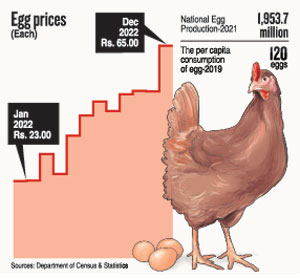News
Producers accuse Govt. of trying to make omelette without eggs
View(s):- Industry says Govt. decision to import would break local egg production; appeal for removal of cess on chicken feeds and utility tariffs
By Chrishanthi Christopher
The government’s decision to import eggs to bring down the prices was a miscalculated policy and would only break the already volatile local egg production industry, local egg producers and economists warned.
They claimed egg imports was not the answer but only the removal of the increased cess on chicken feed and the utility tariffs could bring down the current high prices of eggs.
The All Ceylon Poultry Farmers Association (AIPFA) said the cost of production of an egg had gone up in recent times and producers spent around Rs. 46 to produce one egg. 
AIPFA President Ajith Gunasekera said the government had made yet another mistake in its decision to import eggs and this would only result in several small farmers winding up as they could not compete with the government suggested price of Rs 42 an egg.
He said the farmers were the first hit when the Consumer Affairs Authority (CAA) gazetted a notification in August last year compelling egg producers to sell an egg at between Rs. 43 and Rs. 45, resulting in many small businesses closing down. The cess on chicken feed had shot up production cost by 10% to 80% making it unprofitable for small producers to continue operations. He said if the prices of feed came down the cost of production would go down by Rs. 10 and an egg could be sold at Rs. 45.
“We have told the Government our difficulties. If it persists with its decision we will fall and the entire industry is in danger of collapse,” he warned.
“The Government is rich in terms of dollars. That is why it is importing,” he added.
The Government had many discussions with egg producers urging them to sell eggs at nominal prices. Despite this the prices of eggs remained high with traders selling at between Rs. 65 and Rs. 70 during the festive season.
Egg producers who blamed the hike on middlemen traders eventually agreed to sell at Rs. 55. The plan was to sideline the middlemen and for producers to sell the eggs directly to consumers, at Rs. 55 an egg.
Following which eggs were transported in vans and lorries and sold to consumers in Colombo, Gampaha and other areas. However this happened only for a few days with producers finding it logistically impossible to continue. Also, many had no resources to do this.
The All Island Egg Producers Association (AIEPA) said the process had encountered a slow down because of the festive season with many workers taking leave. The results–egg prices shot up during the festive season with consumers paying up to Rs. 70 or Rs.75 an egg.
AIEPA Secretary H.N.B.R. Alahakoon said nevertheless they had proved that eggs could be sold at Rs. 55 and it was the middlemen who were hiking prices. With the festive season over he said the demand would fall and they could resume distribution in vans targeting economic centres in the provinces.
Meanwhile, the Peradeniya University’s Economic Department Prof. Wasantha Athukorala said the root cause of the price hike was the Government’s decision to increase cess on chicken feed.
He said, the cess increase had raised the cost of production. The rise in tariffs in water and electricity bills had also contributed. He said local poultry farmers had been drastically hit since 2021. Of 1563 large scale industries that produced more than 1000 eggs, more than 480 closed last year, with only about 1080 production houses operating now.
Meanwhile small scale farmers who produced below 1000 eggs thrived, with a 13% increase in the sector. What was 24,798 in 2021 had now increased to 28,061 farmers. This was attributed to the economic crisis in the country which had pushed many poor families to give up on eggs, their only affordable protein supplement.
Other factors were the increased tariff on utility bills including water and electricity, increased cess on chicken feed and the imposition of a ceiling on egg prices in August last year, with egg production dropping by eight million. The scale tipped from 162 million eggs in 2021 to 154 million eggs in 2022. In 2017 the industry produced 172 million eggs.
The previous government’s decision to ban the use of chemical fertiliser also impacted the country’s maize cultivation which was the main source of chicken feed.
Meanwhile, Agriculture Minister Mahinda Amaraweera said the imports would be only for a short time and appropriate steps would be taken to promote the local egg production industry in the next few months. He said villagers and unemployed youth would be encouraged to start poultry farms in their home gardens. Unused state land would also be provided along with financial assistance to start poultry farms. He said plans were also going ahead to boost maize cultivation.
Trade Minister Nalin Bandara said last week the import of eggs would arrive in the course of this week. However it was learned that the eggs need to be risk assessed before clearance from the Port. In keeping with the Animal Production and Health Department’s Animal Diseases Act no. 59 of 1992, a health certificate had to be submitted to quarantine officers once the consignment arrived and at the time of clearance. This would take up to seven days.

The best way to say that you found the home of your dreams is by finding it on Hitad.lk. We have listings for apartments for sale or rent in Sri Lanka, no matter what locale you're looking for! Whether you live in Colombo, Galle, Kandy, Matara, Jaffna and more - we've got them all!

